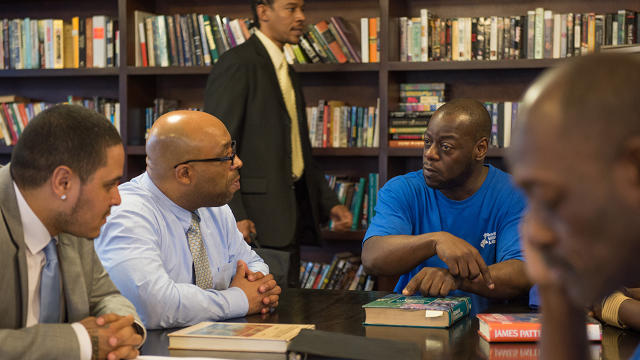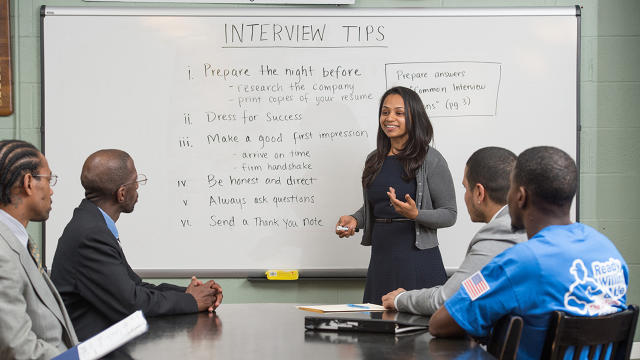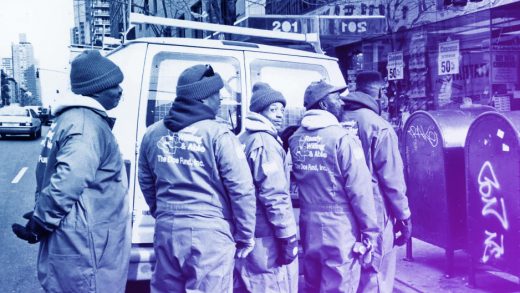When The Gap In Your Resume Is Time Spent In Prison
Maybe you’ve been in this situation. You’re going out for job interviews, but there’s something that has you worried: a gap in your resume. Maybe you were between jobs. Maybe you had to take care of a loved one, or yourself. Whatever the cause, it feels like a liability.
On an October evening in Brooklyn, six men gathered to wrestle with this very problem—how to address that resume gap. They’d assembled for mock interviews with volunteers who held day jobs at HSBC. While they varied in age, the interviewees shared a resume gap for the same reason: time spent in prison.
“Some of these gentlemen had never worn a suit before, never worn a tie before,” John Powell, a career development specialist at the Doe Fund, told me. “I’ve seen some hold their resume like a newborn baby.” The Doe Fund, a New York nonprofit dedicated to breaking cycles of homelessness and incarceration, was convening this final exercise after a month-long job-preparedness class. In 1990, the organization launched its “Ready, Willing, and Able” program, which has helped tens of thousands of ex-offenders successfully reenter the workforce. The Doe Fund says participants in its programs experience a 67% job retention after six months, and that “Ready, Willing, and Able” reduces recidivism by 60%.
While there are plenty of other many other organizations doing similar work, the Doe Fund is now looking to expand, and this year rolled out a national campaign to pitch municipal leaders on adopting it.
Multiple Obstacles, Limited Solutions
Of the more than half million Americans who get released from jails and prisons each year, about two-thirds are arrested again within the next three years. But a recent study from the workforce development firm America Works, conducted in conjunction with the think tank Manhattan Institute, demonstrates that employment reduces recidivism—and that the sooner ex-offenders get to work, the lower their chances are of being reincarcerated. That’s a big reason why nonprofits like the Doe Fund devote considerable resources to career training for the population it serves.
Of course, ex-offenders face all sorts of obstacles when trying to find work, many of which prevent them from ever reaching the job interview stage. For many, it starts with a lack of access to a ladder of legitimate opportunity, shunting them toward illegal ways of earning a living to begin with. It’s also well-known that people often find jobs through their social networks; being locked up strains one’s social fabric. Not only that, but incarceration doesn’t exactly instill the skill sets employers look for.
Even when ex-offenders clear all those hurdles, they often face discrimination for having been convicted of a crime, no matter its nature or how far in the past. Federal law prohibits businesses from imposing blanket bans on hiring ex-offenders, but many employers disregard that rule, and enforcement can be spotty.
In recent years, criminal justice reformers have urged lawmakers to “ban the box,” ending the requirement for job applicants to disclose past convictions. Ban-the-box policies are in effect in 150 cities and counties, according to an October report from the National Employment Law Project. A year ago, President Obama got behind the initiative, which spurred more adoption. But while heavyweight GOP fundraisers like the Koch brothers support certain reforms, President-Elect Donald Trump’s tough-on-crime stances—consider his proposal for nationwide stop-and-frisk, for instance—cast some doubt on the future of these efforts.
There’d be certain limits to federal reform anyway, though. New York State, where the Doe Fund operates, has some of the strongest laws protecting ex-offenders from employment discrimination; it’s illegal in New York to ask candidates about a criminal record in initial interviews. But New York employers are allowed to conduct a background check before making a job offer, so a diligent hiring manager is still likely to find out about your record if you have one.
Considering all this, the men participating in the Doe Fund’s mock interview that evening in Brooklyn had already beat a set of enormously long odds. What they had come here to practice was how to beat still more of them.
Explaining The Gap
I met 26-year-old Abraham Mateo a few hours before his mock interview began. He’d grown up in the Bronx near Yankee Stadium; some years ago, Mateo told me, he’d had been working as a teller for Bank of America, but gradually got drawn into “a side thing” and quit. He was later pulled over in New Jersey and charged with a DUI and possession of marijuana that he maintains wasn’t his. That, coupled with a few prior encounters with the police, was enough to send Mateo to prison.
By early 2015, he was out; by 2016, he was in a mandatory outpatient program for alcohol abuse, a program that referred him to the Doe Fund for help to secure employment. Mateo, like his Doe Fund classmates, has spent several months cleaning parks and streets in Manhattan (“It’s grueling, it’s humbling,” he said), and after a month of weekly classes with Powell, it was time for Mateo to apply for jobs.
“Abraham made clear,” said Powell, “‘I don’t want to work with my hands, I want to work with my mind, with computers, to sit behind a desk, think, and solve problems that way.’”

Soon, a Doe Fund employee opened a door to a multipurpose room and showed in Mateo, who was wearing a suit lent him by the outpatient treatment program. The three HSBC volunteers, each looking serious, were seated in the room, where they’d be conducting mock interviews concurrently with Doe participants.
Mateo and I approached Marlon Zuniga, an HSBC business administrator, whose expression seemed stern. After a few introductions, Zuniga invited Mateo to discuss his experience.
“So at my last job, I was a manager for a bank,” Mateo began, explaining that he’d handled tax returns for people earning less than $50,000 a year. He walked Zuniga through the ins and outs of his former job. When Zuniga asked about Mateo’s skill set, Mateo replied smoothly, remarking that most of his jobs had to do with assisting clients. “It’s just who I am. I like to help people.”
A few minutes in, Zuniga seemed to be winding up for the tough question. He began to examine the dates on Mateo’s resume. “There’s a gap . . . ” Zuniga began, pointing to the hard copy on the table before him.
“Yes,” conceded Mateo.
“At that time period I was in school,” I heard Mateo say.
Zuniga, it turned out, had asked about a different gap in Mateo’s resume, one that was much easier to address. In the next few minutes, Zuniga wrapped up the interview, then gave Mateo some quick feedback: “Don’t lean—like this,” Zuniga demonstrated, leaning back in his chair. He modeled a more erect posture. “And make a bit more eye contact.” Also, Mateo would need a more professional email address; the one currently topping his resume began with the handle “easyabe.”
Afterward, I asked Mateo if he was relieved on some level about Zuniga’s mix-up. Mateo said that he did feel some relief—but also regret. He wished his mock interviewer had tried the tough question on him. “Why? I have to put myself in that position, so I can practice engaging and discussing what I’ve been through . . . I know it’s gonna come up. It’s there. People are gonna ask. And transparency is so important. I have to be very honest.”

“I’m ready. I’m just ready, man,” said Mateo, with some disappointment, of fielding the gap question.
So I decided to lob it at him.
“Mr. Mateo,” I said, reaching for his resume. “I notice there’s a gap of about two months in late 2014. I’m wondering if you can talk about that brief gap.”
Resuming mock-interview mode, Mateo swallowed and grew solemn. “I’m glad you actually asked that question,” he began. “During that time period I was charged with a DUI in the state of New Jersey, and that was approximately two and a half years ago. At that time in my life, I was a risk taker, taking chances.”
His answer was thoughtful but not overly studied. “Through the charge, and the incarceration as well, I’ve learned different things. I’ve learned about integrity, about my character, and I’ve learned that the man who was in that situation is not the man that’s sitting here today. I’ve progressed,” Mateo continued, “and even though I had that situation, what I’m grateful to say is that I’ve taken care of it. Despite the incarceration I’ve continued to seek employment and stay employed.”
He brightened up. “And also, listen, a DUI’s pretty expensive! So, you know, I’ve also assessed all those fees, and I’ve taken care of it. I look back and it’s my past. Does it define what I’m gonna do in the future? Absolutely not. It’s made me a stronger individual.”
“Listen, you know?” Mateo wound down his pitch with composure and confidence. “Mistakes—hopefully we can move forward. And I believe we will.”
He seemed ready to me.
Fast Company , Read Full Story
(71)









